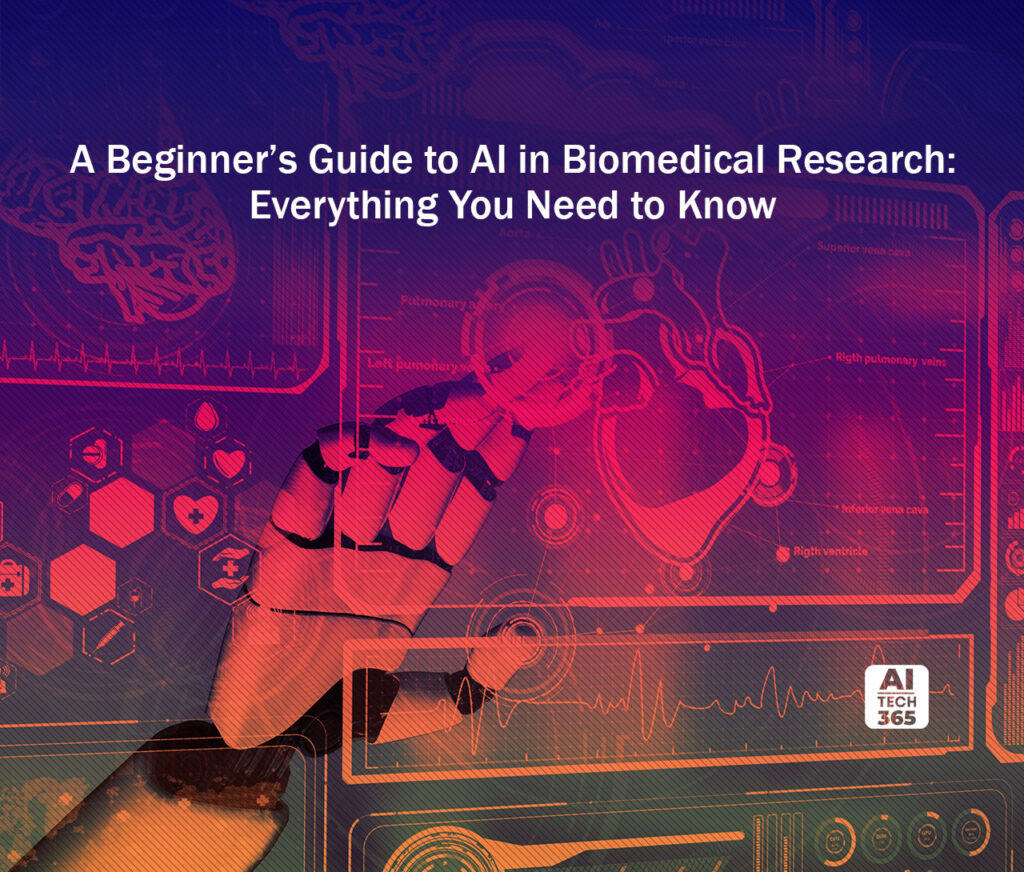In recent years, the integration of artificial intelligence (AI) has sparked a transformative shift in the way we approach healthcare, disease diagnosis, and drug discovery. With the ability to process vast amounts of data and identify complex patterns, AI has become an indispensable tool in the pursuit of innovative solutions to some of the most pressing medical challenges. This blog aims to explore the profound impact of AI in biomedical research, shedding light on its key contributions, challenges, and future potential.
What Does AI in Biomedical Research Mean?
AI in biomedical research refers to leveraging AI technologies to analyze intricate medical data, predict outcomes, and discern patterns across various biomedical applications. This encompasses the application of AI algorithms in medical image analysis, including automated assessment of cardiac MRI scans, detection of liver lesions and lung nodules in MRI and CT scans, and evaluation of echocardiograms for cardiac evaluation.
Moreover, AI plays a vital role in analyzing chest X-rays for pneumothorax indicators, examining brain CT and MRI scans for patients with brain injuries and neurological disorders, and scrutinizing retinal images for diabetic retinopathy detection. The application of AI in biomedical research holds the potential to revolutionize medicine, enhance patient care, and advance healthcare through precise and rapid clinical decision-making, optimization of innovation, and cost-effective research processes.
How Can AI Be Used In Research?
AI offers diverse applications in research including:
- Data Analysis and Pattern Recognition: AI algorithms excel at analyzing vast datasets, uncovering patterns, correlations, and trends. This proves invaluable in genomics, climate science, and social sciences.
- Natural Language Processing (NLP): NLP enables computers to comprehend and generate human language. Researchers leverage NLP for analyzing textual data, extracting information, summarizing documents, and gauging sentiment in fields like literature, linguistics, and social sciences.
- Recommendation Systems: AI algorithms deliver personalized recommendations, aiding researchers in discovering relevant papers and conferences, and optimizing information discovery.
- Automation of Tasks: AI tools automate tasks such as data collection, analysis, and even writing and editing, freeing up researchers for more creative and strategic endeavors, thereby boosting productivity.
- Streamlined Experimentation: AI tools assist in experiment design, parameter optimization, and automated data collection, saving time and reducing human errors in the research process.
How Is AI Used In Biomedical Science?
Artificial intelligence is reshaping biomedical science and healthcare with its multifaceted applications. In medical imaging, AI algorithms scrutinize CT scans, x-rays, MRIs, and other images, enhancing diagnostic precision and efficiency. In clinical decision support, AI assists healthcare providers in making well-informed treatment and medication decisions. Moreover, AI streamlines the identification of potential drug candidates and optimizes clinical trials, potentially reducing drug development timelines and cutting R&D costs.
Additionally, AI contributes to predictive analytics and personalized medicine, tailoring healthcare decisions to individual patient characteristics. Despite the promising potential, challenges such as ethical considerations and data privacy need addressing. Continued advancements in AI technology and collaborative efforts among researchers, healthcare providers, and policymakers can overcome these challenges. The future of AI in biomedical research and healthcare holds great promise for groundbreaking innovations in disease management, precision medicine, and healthcare delivery.
4 Major Applications of AI in Biomedical Research
Given below are some of the important applications of artificial intelligence in biomedical research.
1. Identify New Targets For Drug Discovery
One of the most exciting applications of AI in biomedical research is the use of large datasets to identify new patterns and insights. In the past, scientists were limited by the amount of data they could collect and analyze. But with the advent of big data, researchers now have access to vast troves of information that can be used to better understand diseases and develop new treatments.
One example of how AI is being used to analyze big data in biomedical research is DeepMind. In 2019, DeepMind developed a new AI model called AlphaFold that can predict the structure of proteins. This is a breakthrough, as the structure of proteins is essential to understanding their function and developing new drugs to target them. AlphaFold has the potential to revolutionize the drug discovery process, and it is just one example of how AI is being used to make sense of big data in biomedical research.
2. Personalizing Medicine
This is another promising area of AI in biomedical research. By using AI to analyze a patient’s genetic profile, researchers can identify drugs and treatments that are most likely to be effective for that patient. This could lead to more personalized and effective care for patients, and it could also help to reduce the cost of healthcare.
For example, a recent study by researchers at Stanford University used AI to identify a new drug treatment for a rare type of leukemia. The study found that the AI-powered treatment was more effective than traditional treatments, and it also had fewer side effects. This study is just one example of how AI is being used to personalize medicine and improve patient outcomes.
3. Automating Clinical Tasks
AI in biomedical research is also being used to automate clinical tasks, such as data entry and medical imaging analysis. This can free up doctors and nurses to focus on more patient-centered tasks, and it can also help to improve the accuracy and efficiency of patient care.
For example, a recent study by researchers at the University of Pennsylvania found that AI-powered software could accurately identify diabetic retinopathy, a leading cause of blindness. The software was able to detect diabetic retinopathy with the same accuracy as a human ophthalmologist, and it was also faster and less expensive. This study is just one example of how AI is being used to automate clinical tasks and improve patient care.
4. Improving Patient Outcomes
AI has the potential to improve patient outcomes in several ways. By identifying new targets for drug discovery, developing new treatments, personalizing medicine, automating clinical tasks, and improving patient care, AI can help to make healthcare more effective, efficient, and affordable.
As AI continues to develop, we can expect to see even more groundbreaking advancements in the field of biomedical research. These advancements have the potential to revolutionize the way we treat diseases and improve the lives of patients around the world.
In a Nutshell
AI in biomedical research is a powerful tool that is rapidly changing the world as we know it. As AI continues to develop, we can expect to see even more groundbreaking advancements in the years to come. These advancements have the potential to revolutionize the way we treat diseases and improve the lives of patients around the world.

